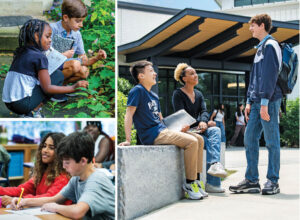Your children’s education lays the foundation for their future success, which is why school choice is so important. When deciding where to send your child, there are two major options: private or public. While public schools are widely available and free of charge, private schools are more selective and have an associated cost. However, it may be in your child’s best interest to explore different types of educational offerings.
Are private schools better than public schools? If you’re looking for a different, mission-driven focused community for your children to learn, the answer is “yes.” In fact, here are all the areas where private institutions specialize.
Environment
Another important factor when comparing public vs. private education is the environment. Public schools are required to admit every student who enrolls. Private schools, on the other hand, are more particular in admissions. This can include any of the following restrictions:
- Entry exams
- Code of conduct agreements
- Minimum grade requirements
AFS is a Quaker school, which means children are surrounded by people who are interested in a particular culture and set of values. Overall, private schools offer parents more understanding and purpose within their children’s educational environment.
Ideology
Many parents want more than just a school for their children — they desire to teach and learning to be deepened by tenets of faith that are actively incorporated into lessons. Due to the separation of church and state, this is something public schools simply can’t provide.
Abington Friends School, on the other hand, includes weekly Meeting for Worship in the manner of Friends. They can also offer spirituality based extracurricular activities, such as volunteer and social justice clubs and groups.
Educational Focus
Some children are gifted in a particular area or already have their hearts set on a future occupation. These students can benefit from an institution that focuses on a specific area, such as the following:
- Art
- Theatre
- STEM
In these genres, the area of focus is incorporated into every aspect of learning, not just offered as an hour-long elective. This provides students with a huge advantage over mainstream peers who can’t access this same kind of knowledge or time provided to focus on their passion.
Unfortunately, not all public schools have the resources to offer this kind of experience. On the other hand, private schools may have dedicated fundraising g that allows them to tailor their curriculum.
Class Choice
Private schools are more likely to offer a variety of class choices outside core topics in the same vein. Many public schools struggle to provide adequate materials for basic math, science, and English; offering classes on architecture, political science, and engineering are out of the question.
There’s also the issue of curriculum mandates. Public schools must follow the curriculum set by the state, which may not allow for topics students are interested in. Private, independent schools have more leeway to offer unique classes while providing a well-rounded education beyond foundation skills.
Class Size
One of the most widely-known differences between public and private schools is class size. The student-to-educator ratio varies in public schools; depending on where you live, classrooms can contain upwards of 30 kids. This crowding is directly tied to a lack of funding that can seriously disadvantage students.
Class size has a huge impact on students’ education, as the more kids in one room, the fewer time teachers have to devote to each one. This can result in students falling behind or other issues, such as bullying, going unnoticed by overburdened educators.
Private schools, on the other hand, tend to have class sizes closer to the ideal. This is because private institutions can cap their admissions, ensuring that class sizes stay small.
Regulatory Freedom
As mentioned before, private schools aren’t subject to the same tight government control as public schools. This can give institutions more room to meet parents’ and students’ needs. For example, private school teacher requirements aren’t as strict as public schools’, allowing an institution to hire a qualified professional to teach an elective such as economics or entrepreneurship.
Test Performance Private school statistics are clear when it comes to testing performance: students at private institutions consistently outperform their public school peers on standardized tests. This is true not only of national skill measurement tests but also on college-readiness exams such as the ACT and SAT.
The benefits of better test performance are twofold. First, higher test scores indicate that students are comprehending the material more thoroughly. Second, test scores impact university admissions. Students who wish to attend a prestigious university will need to score in the highest percentiles.
Parental Involvement
Private schools encourage parent involvement, even going so far as to have designated Parents and Grandparents Days. Educators are also more likely to be in communication with parents, allowing more open lines of communication and connection. This increased involvement translates to greater support for students both at home and at school.
Extracurricular Programs
Abington Friends School offers over 100 extracurricular clubs and activities. They have a competitive Robotics team, an award-winning theatre program and an entire department dedicated to experiential learning opportunities
beyond the classroom. These opportunities range from week-long trips to small learning pods of students interested in business or medicine professions.
Safety
Safety is a huge concern for parents for any school-aged child. Private schools are statistically far less likely to see mass shootings as well as other types of crime. For parents who worry about high rates of drug use or violence in their area, private schools can offer additional ways to keep their children safe.
If you’re dedicated to securing a quality education for your child, you’re not alone. Here at Abington Friends School, we believe that students learn best when fully engaged and supported by their community. To learn more or enroll your child, give us a call at 215-576-3950, or connect with us online.

